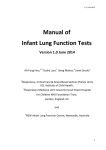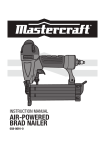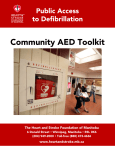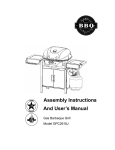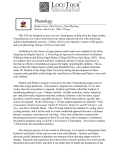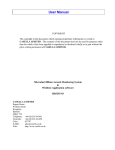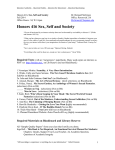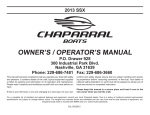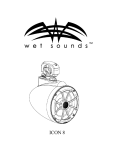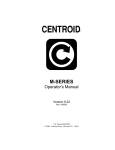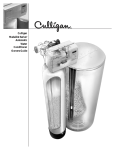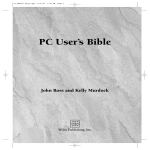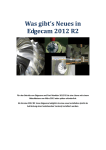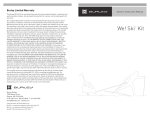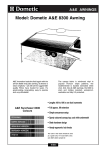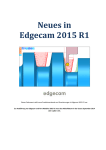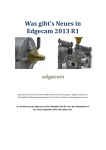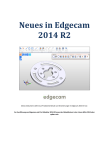Download volume 6 number 21 spring 2002 volume 6 number 21 spring 2002
Transcript
volume 6 number 21 spring 2002 FEATURES Don’t Blow a Gasket 6 Guiding Principles – the Advantages of Linear Guides 9 Got Milk? 15 In the Wake of Success 20 Prototyping by Voodoo 34 15 EDITORIAL Ingenuity 2 4 INDUSTRYNEWS In With a Roar – Haas Hits WESTEC 3 Mini Mill Learns German at Blaupunkt 3 Changing Perceptions – New Products on the Horizon 38 34 RACEREPORT NASCAR Bump and Grind 4 CART Developments 5 NHRA 5 EDUCATION The Centre of the Great White North 32 9 HELPFULHINTS The Answer Man – Applications Solutions 40 C O N T E N T S 6 IN THIS ISSUE volume 6 I spring 2002 t never ceases to amaze me, the myriad things that can be – and are – produced on CNC machines. Yet, most of the general public has little or no concept of what a machine tool even is. Explaining to someone “not in the business” what we in the industry do is always a challenge. And when it comes to describing CNC machines, I usually end up resorting to the rudimentary drill press as a starting point (even the most mechanically sheltered person usually has some concept of what a drill press is) and working from there. Eventually, some semblance of understanding about these miraculous machines dawns on the recipient of my lengthy discourse. Either that, or they’re just faking it to be polite. Going back in history a bit, we visited a shop in Riverton, Machine tools are vital in today’s world, and have been New Jersey – a stone’s throw from Philadelphia – that since the dawn of the Industrial Revolution. The advent of manufactures machinery to make a product that was first computer numerical control, something most of us now take for patented in 1915. The Arthur J. Evers Corporation produces granted, has made them even more so. We would be hard machines that cut and score paper for paper bottles – that’s pressed to find anything in our everyday lives that has not, at milk cartons to you and me. Their switch to CNC not only some point, been “touched” by a machine tool. They truly are helped them make better machines, but helped their customers the “mother machines” from which all else is born. make better cartons, and make them faster. In this issue of CNC Machining, you’ll find several On a more futuristic bent, we have a story about a examples of products, parts, things – even people – that owe company using lasers to cut gasket material, and we venture their existence to CNC machine tools. into the world of magic and voodoo with a company that is For our cover story, we ventured to the Windy City for a using CNC machines to bring prototype products to life. story about a gentleman who had no idea what a CNC machine But wait, there’s more. We also have a very informative was . . . but bought one anyway. With a bit of training, lots of piece about linear guides and how they are improving today’s perseverance and a touch of luck, he has found himself riding machine tools, and you’ll find a story from the Great White the wake of a major speedboat manufacturer as an OEM North about the first Haas Technical Center in Canada. If that’s supplier of parts and accessories. not enough, there’s still the race report, a review of new products from WESTEC and two pages of applications solutions. So sit back, relax and enjoy! THE MASTHEAD CNC Machining is published by Haas Automation, Inc., 2800 Sturgis Road, Oxnard, CA 93030, 805-278-1800, Fax 805-988-6918. Postmaster: Return invalid addresses to Haas Automation, 2800 Sturgis Road, Oxnard, CA 93030-8933 postage guaranteed. CNC Machining is distributed free of charge by Haas Automation, Inc., and its authorized distributors. CNC Machining accepts no advertising or reimbursement for this magazine. All contents of CNC Machining are copyright 2002 and may not be reproduced without written permission from Haas Automation, Inc. CNC Machining is distributed through a worldwide network of Haas Automation distributors, and by individual subscription request. Contact Haas Automation headquarters via mail or fax to be added to the subscription list. Published quarterly. © Haas Automation, Inc. & CNC Machining Magazine names. Designed and printed in the U.S.A. CPC # 1563572. www.HaasCNC.com. Haas Automation Europe, ++32-2-522-9905 United Kingdom, ++44-1603-760539 number 21 Zane Schwenk, World Championship Pro-Wakeboarder and X-Games Gold Medallist, livens up our cover this issue. cover photo courtesy MasterCraft 20 > EDITORIAL in•ge•nu•i•ty 1. the quality of being cleverly inventive or resourceful; inventiveness. 2. cleverness or skillfulness of conception or design. 3. an ingenious contrivance or device. This is the word that keeps coming to mind as I travel the world visiting customers. I recently returned from a trip to Europe – one of those four-countriesin-eight-days trips – where this word came to mind again. Long flights provide plenty of time for thinking. Leaving LAX on Saturday, I arrived in Belgium on Sunday after an uneventful flight – the best kind these days. I started off Monday visiting our office in Brussels, where the applications engineers showed me some of the projects they were working on. Working together with customers to improve their processes, they were using unique tooling and clever programming to help them achieve their goals. One customer was trying to reduce the setup and load time of his parts, while maintaining the necessary accuracy and improving cycle time. When I left Tuesday night, the resourceful engineers were doing the final tweaking on the application – another unique part, and another unique application made better by today’s technology. On Wednesday morning, I flew to Stuttgart, where I visited a customer with yet another set of unique parts and manufacturing opportunities. Walking through the factory, I was impressed with the productivity they had achieved, and with the sheer volume of parts being manufactured. Their skillfulness was amazing. Then it was back to the airport for a flight to Zurich and another visit. This visit showed the inventiveness of the human mind, and revealed a completely different use of machine 2 CNC MACHINING > INDUSTRY NEWS by Denis Dupuis tools to make parts. I can’t give you more information, as the parts and applications are proprietary. (Thank goodness many of our customers do let us give you more information, or this magazine would not exist.) Late Wednesday, I’m on another plane, this time to Venice, followed by a short drive up to Pordenone, Italy. I spent Thursday at a machine tool trade show that featured most of the machines built by our industry. The show was crowded, both with equipment and with people buying and selling their wares. It was a gigantic bazaar, if you will: a mixture of machines and people from all over the world, speaking at least a dozen different languages. Thursday night, I was on a plane back to Zurich , followed by a train ride to Biel/Bienne: the watch capital of Switzerland. On Friday, I visited another factory, where I saw proven technologies (tried-and-true assemblies) skillfully combined with new assemblies to create a new piece of equipment. This unique machine will open up a whole new market for the manufacturer. It was interesting to learn how the company had come up with the ideas for the product, and to see its development through the design and prototype processes. Ingenious! On Saturday, I visited with friends, and saw a new, and resourceful, way to ride a skateboard. I guess when you’re 3 1/2 years old, it’s easier to lie on your stomach and ride face down – you have better control coming down the incline of the driveway. I think I saw a future Olympic gold medal winner in the luge in the making. Saturday night I caught a train back to Zurich for the early morning flight back home on Sunday. I think the word ‘ingenuity’ really struck me as I was flying home after this visit. When you compare the history, the beautiful ancient buildings, the narrow streets and the sense of family you see in Europe with the modern equipment and manufacturing processes of today’s world, the contrast seems more distinct. Seeing all that can be achieved – from the cathedrals built by hand 500 years ago, to the parts being manufactured bigger, better, faster and cheaper today – it gives me hope that maybe we can have peace in the world one day . . . and we won’t have to line up for hours to clear security to get on an airplane. Haas Roars into WESTEC In like a lion, out like a lamb. That’s what they say about March. And while that might be typical for the weather – at least in many parts of the country – for much of the machine tool industry, this March is shaping up to be more like “In like a sickly kitten . . . and hoping to get out alive.” Southern California is far from typical, though: Blue skies and warm weather are the norm – not only for March, but for most of the year. And Haas Automation is far from the typical machine tool manufacturer: Despite a worldwide slump in machine tool consumption, Haas is only slightly off previous years’ numbers, and continues to gain market share. Clearly, Haas is getting the lion’s share of sales in the markets in which the company competes. The number of companies exhibiting at this year’s WESTEC show was also down considerably, and it is expected to be off for other regional shows around the country. Many longtime exhibitors have been downsizing their show booths, or pulling out altogether. Being an IMTS year, it is suspected that many manufacturers may be hoarding their resources for Chicago, rather than “wasting” them on smaller shows with less perceived value. Not so for Haas Automation. As the “hometown” show, WESTEC is historically where Haas debuts many of its new products, and this year was no exception. Haas filled its 5,280-squarefoot booth with 21 machines this year, many of which were completely new products. Eleven additional Haas machines were on display in other booths around the hall, as well. Haas will also be present in force at other shows around the country throughout the year, including a 10,000square-foot presentation at IMTS in September. Be assured that Haas Automation will continue to roar through 2002 with innovative new products, highvalue options and affordable prices. For a look at the latest from the Haas Automation design team, check out the New Product Release section on page 38. Blaupunkt GmbH Claims EMO Prize The Hildesheim (Germany) division of automotive electronics manufacturer Blaupunkt GmbH is the proud owner of a brand-new Haas Mini Mill, courtesy of Haas Automation Europe. Blaupunkt won the machine after entering a prize drawing at the Haas Automation Europe booth during the 8 days of EMO 2001. More than 5,000 visitors entered the drawing, but a random number generator chose just one lucky company to receive the first prize. The sprawling Blaupunkt Hildesheim facility, located in the rolling hills close to Hannover, is developing the next generation of advanced in-car navigation systems. According to Blaupunkt’s Ing. Lutz Böttcher, the Mini Mill will play a key role in the new product development process. “The Haas machine will be used in the Sample Engineering Department at Blaupunkt Hildesheim, making parts for prototypes, and development samples for future models of our systems. “Currently, the Haas is running just one shift a day,” Böttcher adds. “However, we already have a lot of confidence in the machine, so we’re planning to run it ‘lights-out’ whenever we need to. We’ll be running it virtually 24 hours a day.” The benefit to the Blaupunkt Sample Engineering Department and the product development cycle will be considerable, notes Böttcher, including reduced product lead times and reduced overall manufacturing costs. “We had no idea we would win the Haas machine,” Böttcher remarks. “We needed the extra capacity in the Sample Engineering Department, but it isn’t often that things happen so fortuitously. We won the machine at exactly the right moment. Even in big companies you rarely get the equipment you need when you need it!” SPRING 2002 3 > RACE REPORT > RACE REPORT acing is all about pushing the limits – of the driver, of R the car, of the team, of the equipment. Push them too far, and something breaks; don’t push them far enough, and you find yourself relegated to the back of the pack. The off-season is a chance for race teams to regroup, reflect and recover. But it is also the time they must review the previous season’s performance, and set their plans of attack for the new season. After months of off-season testing, drivers are ready to try out some real racing against the best in the sport. With several racing teams using Haas machining centers to shape many of the precision engine, chassis and suspension parts, it’s a sure bet they’ll be prepared to push the limits during their year-long struggle for the series championships. NASCAR Winston Cup If the Daytona 500 is a sign of things to come, then this season’s NASCAR Winston Cup Series will be full of competitive sideby-side racing and wild finishes. Ward Burton survived a crash-marred race to capture his first Daytona 500 with a final three-lap sprint to the finish. Although Jeff Gordon’s DuPont 200th anniversary car seemed in command of the race with five laps to go, a bump from Sterling Marlin sent him spinning into the infield grass. The race was then red flagged for 20 minutes to clear the track of debris, a situation which added yet another unexpected twist to the race’s wild ending. Taking advantage of the red-flag lull, Marlin jumped out of his car to repair his fender – a big no-no – and was rewarded with a penalty from the officials, leaving the track wide open for Burton to hold off Elliott Sadler and win by three carlengths. “Today we had some luck. We were in the right place at the right time,” said Burton. Following the race, Gordon, the 2001 Winston Cup champion, accepted the blame for the crash that led to the red flag. “I should have just given up when he (Marlin) got beside me and still had a battle and a shot to win the thing,” said Gordon, who rallied to finish ninth in the first race of his quest for a fifth Winston Cup championship. photo: Chris Stanford / Getty Images 4 CNC MACHINING Gordon was still in contention at the end of the race, despite an incident with Kevin Harvick that eliminated nearly half the field. Gordon bumped Harvick and sent him spinning into the wall. Harvick’s car then slid down the track in front of a pack of cars racing at close to 190 mph. One of the 18 victims of the subsequent pileup was Gordon’s teammate, Jerry Nadeau, who limped his damaged car home in 28th place. Rookie-of-the-year candidate Jimmie Johnson, the newest addition to the Hendrick Motorsports Winston Cup family, was more fortunate, managing to miss all of the accidents and finish in 15th place.”All things considered, this is a great finish for the team,” said Johnson, who won the pole with a 185.83-mph qualifying lap. The second week of racing saw Gordon finish seventh in the Subway 400 at North Carolina Speedway and move up to fourth place in overall points standings. After the second of 36 races, Terry Labonte is 16th in the points, Jimmie Johnson is 21st and Jerry Nadeau sits in 26th. NASCAR Busch Series Hendrick Motorsports also had a successful opening weekend for its new Busch team in the EAS/GNC Live Well 300. Jack Sprague, who moves to the Busch Series after winning the Craftsman Truck Series 2001 championship, battled other drivers in his new No. 24 NetZero Chevrolet Monte Carlo for seventh place, while teammate Ricky Hendrick, who has also moved to Busch, finished in 27th place. “I’m happy with our performance today,” said Sprague. “This is the first time I’ve run here at Daytona and finished in the top 10. The way I see it, these were the first two Busch Series speedway cars that Hendrick Motorsports built, and they were awesome.” photo: Robert LaBerge / Getty Images Ricky Hendrick’s No. 5 GMAC Financial Services Chevrolet Monte Carlo got caught in a wreck on lap 103, which damaged the radiator and kept him from a top-10 finish. “Of course we wanted more,” said Ricky, who finished second in the NASCAR Craftsman Truck race at Daytona last year. “Racing at Daytona feels like being on a playground. You get to race fast with great guys in great equipment. I still love this track, and racing is the only thing I want to do.“ Sprague’s success continued through races two and three, with a pair of sixthplace finishes that bumped him to first in the points standings. “I’m definitely not complaining about another top-10 finish,” said Sprague. “I’m really happy with the way things have gone so far. This team is awesome, and we are determined to get better as the weeks go on.” CART After a year of problems and a lack of leadership, CART has hired a new president and CEO in hopes of turning around the struggling racing league. Rick Pook, the founder of the Long Beach Grand Prix, brings his years of racing experience to the open wheel circuit. “I can’t change the past, but I am going to change the future,” Pook declared. “We are starting to listen to our sponsors and promoters and understand their needs.” A new television contract is one step in the right direction. For the first time in the 23-year history of CART, every event on its 2002 FedEx Championship Series schedule will be aired on live television in the United States. The package is anchored by 12 races on the Speed Channel, with six events currently scheduled to air on the CBS television network. Pook has already made some changes as president, the most noticeable being a change in street and road course qualifying. The driver setting the quickest time on Friday will earn 1 point, the provisional pole position and be assured of at least a front-row starting spot. On Saturday, the fastest qualifier will also earn a point and can still win the pole. “We need to give the fans and the media a story on Fridays, and this is a way to create more interest,” said Pook. Both days will also feature a 60-minute qualifying period in which all drivers will be on the track together, instead of having a fast and slow group like previous years. “It’s a lot more interesting to have Friday qualifying for the general public, and it’s more challenging for the drivers, because we have to be ready to run 100 percent by that first afternoon,” said Cristiano da Matta, a three-time winner in 2001 and a serious contender for 2002. CART has also chosen to eliminate the Dayton Indy Lights Series for 2002, opting instead to “consolidate its operational and marketing efforts behind a single, top-level development racing series.” The CART Toyota Atlantic Championship Series has been enhanced to provide a more viable and effective development series for open-wheel racing teams and drivers. In other CART news, PacWest Racing Group has officially changed their name to PWR Championship Racing. With the name change comes some driver and equipment changes, as well. Scott Dixon (2001 CART Rookie of the Year and 2000 Indy Lights champion) once again will drive for PWR, but this time he’ll wear the lucky number 7. His new teammate, who takes over the seat vacated by the retiring Mauricio Gugelmin, is Oriol Servia, the 1999 Indy Lights champion. Both drivers have been hard at work with pre-season testing at Sebring, Laguna Seca and Homestead. On the equipment front, PWR has traded their Reynard chassis for the new Lolas, but has opted to stick with the Toyota power plant for another year. During the CART Sneak Preview at Laguna Seca, Dixon consistently ran in the top 10 in the new chassis. “Overall it was a good test, because we had a lot of track time,” Dixon said, “which will help us prepare for Mexico.” The PacWest/PWR team enters its 10th season in 2002; the team is currently preparing for the CART FedEx Championship Series opener on March 10 in Monterrey, Mexico. NHRA J&B Motorsports’ driver Todd Veney kicked off the 2002 season with races in Florida in March. Veney, who is racing in the NHRA Federal-Mogul Funny Car Series, is scheduled to compete in Chicago in April, and then at the 22nd Annual NHRA Southern Nationals in May. Look for more news about the Haas sponsored teams in future issues, as they drive for championship points. SPRING 2002 5 Don’t Blow a Gasket! Laser Cutting System is Fast, Accurate, Easy to Use ention lasers to most people M and they envision explosive scenes from science fiction movies, or a web of “Star Wars” defense satellites encircling the earth, Story Scott Weersing knocking out nuclear missiles with beams of light. But today’s lasers find use in most peoples’ everyday lives: grocery store scanners, CD players, pointers – they all use lasers. Photos Scott Rathburn Lasers also find common use in the medical, fabrication and manufacturing industries. These industrial lasers are designed to concentrate high amounts of energy into a small, well-defined spot – approximately 0.003 to 0.006 of an inch in diameter. The resulting energy density vaporizes materials in a very small area, and because the beam’s energy is applied only where it is needed, the heat-affected zone surrounding the focus area is minimized. The J. Miller Company has been using a Haas Z-1 laser cutting system – the first such system from Haas – to make gaskets since November 2001, and is finding it to be faster and more accurate than other lasers on their shop floor. The Sun Valley, California, company specializes in die cutting and gasket fabricating, and has been using an Italian laser for several years. But Richard Miller, production manager of the laser division, has been surprised with Haas’ first entry into the laser field. “I love it. It is a great machine because it is a lot more accurate. I can do things with it that I can’t do with our other laser,” says Richard. “It seems to cut things faster and cleaner.” The Z-1 laser has the same footprint and looks very similar to the popular Haas Mini Mill, but uses a 100watt Coherent Diamond-Series sealed CO2 laser – rather than a standard spindle – to cut thin, nonmetallic materials. The J. Miller Company is using the Z-1 laser primarily to make gaskets, and is saving production time in the process. The company uses automatic flat platen machines to make many of their gaskets out of rubber, paper and other materials, but the Haas laser speeds up production of complicated gaskets. “Instead of making a tool to cut a complicated gasket, the laser can just make the gasket, saving hours of production time,” explains Dennis Miller, president of the company and father of Richard. (continued) ➪ Richard Miller of J. Miller Company likes the speed and accuracy of the Z-1 laser for cutting gaskets. 6 CNC MACHINING SPRING 2002 7 The laser can vaporize a variety of materials, such as plastic, paper and rubber, as well as others. “Anything that can be die-cut can be done on the laser,” Dennis adds. One advantage of laser cutting is the simplicity of handling without having to worry about stretching and distortion from a die-cut machine. “We were trying to die-cut a Teflon ring, and were having a lot of problems with it stretching when trying to get it back out of the die,” says Richard. “The Haas laser cut it in a minute – cut it right to specs and held the tolerances we wanted.” The material being cut on the Z-1 is held in place by a vacuum fixture mounted to the table. “Since the laser does not make contact with the material, you don’t have to worry about the material moving,” says Richard. “But the vacuum does help suck out any smoke produced by the laser cutting, and it clears away the smell when you open the door.” One advantage of the new Z-1 laser over others is the acclaimed userfriendly Haas control. Richard didn’t have any Haas CNC experience, but still was able to pick up the control quickly. He especially likes features such as single-block feed and being able to program subroutines at the control. “With the Haas, I can stop it wherever I want to and change something. I am doing block editing,” Richard explains. “I can create 8 CNC MACHINING Guiding Principles StoryPatrick Scott PhotosScott Rathburn IllustrationsCourtesy Bosch Rexroth Corporation The Z-1 laser cutting system uses the same user-friendly control as all Haas CNC machines. subroutine programs to get maximum yield out of the material, where I can’t do that on our Italian laser.” Speed is another advantage of the Z-1. “It will do 500 inches per minute, while our other laser can only do 100 inches per minute,” notes Richard. Just like CNC machining saves time, so does the new Z-1 laser. “I have run stuff on the other laser and it takes a minute and half, and then on the Haas, it takes me half the time. The Haas laser is saving us time, and we are able to better utilize all of the material through subroutines,” relates Richard. Richard designs the gaskets in AutoCAD, then imports his work into a MillWrite CAD/CAM program to generate the G code. “The MillWrite has saved me hours in programming, and I can edit the program later while I am running the job at the machine, so I don’t have to go back to the computer,” he says. The laser can also be used for engraving. “The laser is much faster and cleaner for engraving than the normal engraving process,” notes Dennis. “We are using it to show a client who does silk screening how the laser can engrave artwork on anodized aluminum. The software we have is great for serialization, where we can engrave serial numbers, fonts or artwork on parts.” Richard Miller likes the accuracy, speed and reliability of the Haas Z-1, but wishes that it had larger travels. “Since we have been using the Haas, we have decided that if the builder of our other laser doesn’t get their butt in gear, then there isn’t going to be any competition for the Haas. Especially if Haas comes up with a laser with a bigger table,” Richard says. Providing solutions to customers’ problems is a Haas trademark. The company is already building the new Z-2 laser that will offer more cutting power with a 500-watt laser, and travels of 40" x 20" x 25" to handle larger jobs and heavier materials. T he need for continuous improvement in machine tool capability has inspired many innovations in the machine tool industry. The demand for faster operation, higher quality output and increased efficiency has led to many of these improvements, and enhancements in motion control J. Miller Company 800-297-3344 technology have brought some of the greatest gains. One of these is the incorporation of anti-friction linear guides, commonly referred to as guide rails. These consist of contoured rails mounted directly to the machine axis, and recirculating ball or roller bearings, typically referred to as trucks or blocks. In order to appreciate the benefits of these products, let’s compare them to other available guidance systems. SPRING 2002 9 >> >> A Tradition of Friction Very rigid carriage assembly Way wiper Gib preload adjustment Bearing pads (gibs) Machine structure with integral ways Box ways, above, offer simple operation and design, but at the cost of relatively high friction and low speed On the other end of the spectrum, hydrostatic ways, below, offer very low friction capability. Box ways are the grandfather of guidance systems. They consist of precision-ground surfaces, operating by sliding along the reference edges. Various configurations exist, but typically are either a “dove-tail” or “square-edge” design. In machine tools, box ways are used for directional control of the slide motion – keeping it “on track,” so to speak. The advantages of box ways are simple operation and design. The disadvantages are relatively high friction and relatively low speed capability. This has led designers to look for alternatives in order to increase speeds and reduce costs. On the opposite end of the guide spectrum are hydrostatic bearings. These employ a fluid film between the guide surfaces to reduce friction and vibrations. The configuration requires a very elaborate, potentially expensive fluid handling system to maintain pressure and volume relationships. Hydrostatic bearings do, however, succeed in reducing friction and therefore increasing speed capabilities. >> and high speed capability, but at the cost of complexity and expense. Adjustable flow restrictor Final filter Pressure regulator Highpressure hose Filter Precise clearance Fluid reservoir Accumulator Guide surface Electrostatic bearing systems require highly complex fluid handling and control. 10 CNC MACHINING Pump SPRING 2002 11 >> The Guide Rail Alternative Simplifying Maintenance and Repair In order to overcome these costversus-performance tradeoffs, many machine designers have come to rely on anti-friction guide rails as a best-ofboth-worlds alternative. These systems, with their precision rails and lowfriction, highly durable components, let designers achieve improvements in virtually all aspects of a machine’s performance: Speed, accuracy, ease of maintenance and repair, and manufacturing flexibility – all keys to a successful machine design. Due to demands of manufacturers worldwide, machine travel speeds are constantly increasing. Rapid feedrates in excess of 3,000 inches per minute are very common. High speeds such as this pose problems with friction and heat generation for sliding ways. High acceleration forces will increase the wear rate, as well. Linear guide rails can No machine design would be complete without consideration of maintenance and repair logistics. Sliding ways are often designed to become part of the structure of the axis. Some machine builders even cast the ways into the mold. In this case, field repairs are difficult, especially if components require removal and replacement. Guide rails, by comparison, are simply bolted to the casting, as are the blocks to the slide. This mounting arrangement often allows a technician to remove or repair the problem area without disturbing the complete machine. rigid as box ways, partly because, in the past, designers relied on massive structures to overcome the problems of unwanted vibrational forces. These designs also relied on massive bearing Whether the guides are provided in matched sets or, even better, as very accurate, individual, interchangeable components, the replacement costs and downtime can be drastically reduced. The machine builder can stock the product in service centers or at the factory, and have local technicians execute repairs on-site. With box ways, the alternative is to return the machine to the factory or employ a machine repair shop – either of which can be costly to pursue. More Flexibility for Machine Designers Lastly, the machine builders themselves benefit from choosing guide rails over sliding ways or hydrostatic bearings. Designers have the flexibility to use similar components on multiple machines. This reduces the manufacturing costs and inventory, and allows logistical flexibility in scheduling production. As mentioned above, repair stock can also be reduced. A wide array of sizes and styles are available to address any nuances of a particular design. Designers can use the inherent accuracy of the guide system to reduce the requirements of positioning feedback and controls. Most designs now incorporate a rotary encoder in the drive motor for screw accuracy, and rely on the bearings to maintain lateral and Machine accuracy requirements are also becoming increasingly demanding, and the guide system plays a significant role here, too. Any deflection or clearance results in >> BECAUSE THE BEARING ELEMENTS ROLL INSTEAD OF SLIDE, THE HEAT GENERATED BY A LINEAR GUIDE SYSTEM IS NEGLIGIBLE. typically handle these speeds and accelerations with no detriment to performance. Because the bearing elements roll instead of slide, the heat generated by a linear guide system is negligible. As a result, continuous rapid traverse is possible, and the wear associated with these adverse conditions is eliminated. Additionally, the force required to move the slide is greatly reduced, which gives the machine designer more flexibility with motor and ballscrew selection. This flexibility in turn leads to cost savings. What about rigidity and vibration? In some cases, the perception exists that linear guides are not as 12 CNC MACHINING systems, which sacrificed speed and dynamic response, while at the same time increasing friction. In today’s high-performance machine tools, such compromises are unacceptable – speed, dynamic response and low friction are absolute requirements. One solution is to adjust the spring characteristics of a linear guide type bearing system with preload to extend the natural frequency of vibration outside the normal operating range of the machine. This is all part of the modern approach to machine tool design, which views the bearing system as an integral part of the total design, yielding much higher speeds and dynamic response, while still addressing vibration concerns. reduced accuracy. Sliding ways inherently have a small amount of clearance, which increases as the surfaces wear during operation. Again, guide rails can use preload to reduce clearances, or eliminate them altogether. Preload provides increased stiffness (rigidity), reducing the system deflection and improving machine tool accuracy. The dimensional accuracy of the bearings themselves also reduces the tolerance stack-up. Most guide rail systems can achieve travel deviation tolerances in the 5- to 10-micron range (0.0002" – 0.0004") for the total length of stroke. Thus, the machine meets the performance criteria without incurring a cost premium. Optimized recirculation results in 5 m/sec velocity and 500 m/sec2 acceleration Smooth and quiet running with optional ball retainer Minimal lubrication consumption due to integrated reservoir Mounting of attachments to runner block from above or below SPRING 2002 13 >> Got Milk . . . height deviation within their dimensional tolerances. This is a very effective way to achieve performance without adding costly components. ome images from the 20th century S Ongoing Innovation are slowly disappearing. The Guide rails themselves have seen important innovations recently. Many now feature clamping or braking components that grip the surfaces and secure a slide in place. Various sealing and lubrication enhancements are also available, both to protect the bearing environment and to reduce maintenance efforts and cost. It is because of the demands outlined above, and the ability of guide rails to meet those demands, that linear guide systems are being selected at an ever-increasing rate. They allow smart corner market is vanishing as large supermarkets and big box stores like Wal-Mart are being built in what once were empty fields. Also disappearing machine designers to capitalize on their features and benefits, and pass those advantages along to machine tool customers in the form of improved performance, lower costs and innovative new features. Profiled Rail and Screw Products Bosch Rexroth Corporation Linear Motion and Assembly Technologies Optimized entry-zone geometry and the high number of balls per track greatly reduce variations in elastic deflection Ball retainer available as an option Smooth, light running due to optimized ball recirculation and ideal tracking of balls/ball retainer 14 CNC MACHINING & Photos Weersing Guide rails and runner blocks available with or without rail seal cover strip. Lubrication access from all sides via threaded metallic end caps Story Scott Minimal lubrication consumption due to an integrated slow-release reservoir Integral, all-around sealing are the days of the milk bottle and Patrick Scott, Product Leader, High level of rigidity in all directions also permits use as an individual block End face mounting holes for attachment of bellows or scraper plates Cartons? better known as a cutter creaser in the packaging industry. The first drum scores the paper, and then another roll cuts the paper into the familiar milk carton shape. The Evers cutter creasers are in use all over the world, including Asia, Europe, Africa and South America. home delivery. There was a time when the local milkman delivered bottles to your doorstep each morning, and this still goes on in some places in the world. However, milk cartons made of paper have replaced the glass bottles of yesteryear, and now, just about every beverage – from milk to fruit juice to wine – can be found in paper cartons. In 1915, the U.S. Patent Office granted John Van Wormer a patent for the first milk carton, which he called a paper bottle. But it wasn’t until 1937 that the familiar gable-top carton went into mass production under the name Pure-Pak. Glass bottles still dominated the market in the 1950s, but the paper milk carton became the choice of supermarkets because of its light weight and strength. The cartons remained the same until 1992, when the premium orange juice makers introduced the resealable cap to the familiar gable-top carton. For Arthur J. Evers Corporation, the milk carton has become the key ingredient in their continuing success. The Riverton, New Jersey, machine shop sits just across the Delaware River from Philadelphia, and specializes in paperconverting machinery – more specifically, creating machines to score and cut milk cartons. Evers began by making printing presses many years ago, but soon realized their niche was in manufacturing the machinery to create the fold lines and cut the paper for milk cartons. The paper comes off the printing press and rolls through the Evers machine – SPRING 2002 15 The key components of the cutter creasers are the rings mounted on the drums that score (create the folds on) a milk carton. The rings are made out of 4130 alloy steel and have a 15-inch outer diameter. To create cartons of various sizes, the rings can be placed on the shell of the drum in different positions. The ability to move the rings has been a big selling point for Evers around the world. “What used to take the 16 CNC MACHINING customer two or three shifts, anywhere from 12 to 24 hours to make a size change, can now be made in less than four hours,” explains Warren Davis, plant superintendent at Evers. While Evers was helping companies save time creating cartons, the company was also looking for a way to save time manufacturing the rings. “We were doing these on a vertical knee mill, and they were taking 75 to 80 hours per ring to machine,” says Davis. “We weren’t really pleased with the quality. It was acceptable, but we knew we could do better.” In 1995, Davis was visiting a local trade show and saw the Haas HS-1RP horizontal machining center making ashtrays. He soon envisioned a Haas in his shop with a tombstone holding the rings. It took a little convincing of upper management, but soon Davis had his first Haas horizontal. “When it came in, I was the general foreman, and for the first eight months I ran the machine, because I wanted to find out what it could do and what it couldn’t do,” says Davis. “We did time studies on die parts, and a die part that used to take three or four hours in the vertical machine, we could do in an hour and a half on the horizontal, sometimes just an hour. Then I found I could run it unattended at night.” It didn’t take long for Davis to realize Evers could use a second horizontal. “The savings were enough that we paid for the machine in six or seven months. We ran that machine 18 hours a day for a year and a half and then leased a second one. Now there are four of them,” he says. The first horizontal took some time for others to get used to. “A lot of the operators, when they were watching me run it, were holding their heads, thinking it would crash,” laughs Davis, “but I knew where it was going. With the old machines, you could hit the start button and it might go where it is supposed to go, or it might go AWOL on you. Once they realized the reliability of the Haas, and that it was going to do what it was supposed to do, there was no problem training others to use the machine. Then they got to the point where they didn’t want to go back to the other machines, because they were slower and not dependable.” Evers now has four HS-1RPs to manufacture the rings. “The ring is put up on a custom tombstone and roughed out. All the major material is removed from the part, and all the holes are drilled and tapped. Then it is taken off and goes to another machine where it is cut into sections, or quadrants. Then it goes back on the Haas to finish everything else,” says Davis. “All the roughing is done with half-inch carbide insert cutters, and then we go down to quarter-inch endmills, and then all the way down to ten-thousandths carbide endmills.” The accuracy of the Haas horizontals allows Evers to make precise finishing cuts in the corners of the scores. “If you look into the corner, to the naked eye it looks like a sharp corner, but it’s a five-thousandths radius done with a ten-thousandths endmill,” says Davis. “The accuracy we have had is tremendous.” Along with the high accuracy has come reduced cycle times: The time to machine a ring has gone from 85 hours down to 40 hours. “We had three machines running all the time. Now that we have four of them, we’ve been able to stop the second shift and still get everything done in one 12-hour shift.” Evers has made some changes to the Haas horizontals to ease operation. One was taking off the doors to the pallet changers, because they found them unnecessary and in the way. Another change was moving the tool probe bracket to a position opposite the operator’s side of the machine. “For everything we do, the X axis stays on center, the Y axis is running up and down and then you have your A axis for your rotary. So we mounted the tool probe out of harm’s way,” says Davis, “because if you drop something on top of the tool probe, there goes your calibration. It has made a big difference.” The shells, which the rings are mounted on, are also machined on the Haas. Using a custom drum, the shells of 4130 alloy steel look like Swiss cheese after being machined with all the holes to mount the rings. The shells need all the holes so that the customer can quickly move the rings to create different size cartons, whether liters in the metric system or pints, quarts and half gallons in the English system. There were once up to 60 people working in the Evers shop, but with the SPRING 2002 17 Haas machines, there are now 35. “We were able to reduce our workforce by more than 25 percent and have moved people to other areas of the shop,” notes Davis. And the Haas machines have been as reliable as advertised, he adds. “We ran the first one for four and a half years without any service calls. The reliability is excellent. If there was a problem, it was common things. The equipment we had before was very temperamental. You pushed the start button, waited and hoped it got to where it was supposed to go.” Davis would like to replace some of the older machines in the shop to take 18 CNC MACHINING advantage of the familiar Haas control. “My objective is to buy a vertical, probably a VF-2, and buy a Haas lathe. We have an older lathe that works fine, but the control is not user-friendly at all.” In the meantime, Evers continues to build from two to four cutter creaser machines per year. The growth has been in making new rings for cutter creasers already in operation around the world. The quick-change tooling is popular, because if a score or blade gets damaged and needs to be replaced, a new ring can quickly be mounted to the shell. And the quick-change tooling allows customers to quickly change carton production from one size to another. The gable-top milk carton can now be found in different aisles of the supermarket, from soups to laundry detergents, and students will continue to enjoy cartons of milk at schools around the world. So as the world’s population continues to grow, and with it, the world’s demand for inexpensive packaging, the Arthur J. Evers Corporation looks to continue producing cutter creasers and rings for packaging companies around the globe. Arthur J. Evers Corporation 856-829-4900 SPRING 2002 19 story and shop photos by Matt Bailey HAT CHANCE photo: Duane Hart / Sporting Images photo courtesy MasterCraft S aturday, Jan 28th, 2002. The Chicago Boat Show. – A tanned Zane Schwenk steps forward, reaches out and shakes the hand of Jim Schultz. “Great job, man. Really great job.” Schultz is visibly pleased with the show of appreciation from Mastercraft’s in-house talent. Schwenk is a top-ranking World Championship ProWakeboarder and X-Games Gold Medallist. When he introduces himself to Schultz he’s standing next to the tool of his trade: a scarlet Mastercraft X-Star speedboat. As a member of the Mastercraft wakeboarding team, Schwenk covets the X-Star – the best ‘tool’ available. With a look of pride, Schultz is also eyeing the X-Star. Above the flawless contours of the hull, bridging the beautifully appointed cockpit and looking not unlike a racecar roll cage, is what is referred to in the Mastercraft literature as the Zero Flex Flyer Tower. Its primary purpose is to provide a rigid tow point for the wakeboarder, but it’s also a cool place to hang chrome-plated audio speakers, spotlights and an integrated board rack. As the tow-point, the Flyer Tower is one of the most stressed and functional parts on the Mastercraft, but that doesn’t mean it can’t be beautiful. Jim Schultz’s Lake Zurich (IL)-based company, Gere Marie, has seen to it that this prominent and vital component not only does its job, but also augments the visual impact of an already stunning creation. As the tow-point, the Flyer Tower is one of the most stressed and functional parts on the Mastercraft, but that doesn’t mean it can’t be beautiful. Gere Marie Jim Schultz started Gere Marie in 1998. “I don’t want to give the impression that the idea to start Gere Marie was just a joke,” he states, “but there was certainly no business plan. It just happened.” While working as a product development engineer, Schultz had become closely involved in the layout and design of his employer’s manufacturing facilities, an involvement which helped to nurture a general interest in manufacturing technology. “I’d driven by the Haas Factory Outlet in Elk Grove Village on a number of occasions,” he says. “One day, during my lunch break, I just stopped to take a look. Out of curiosity, really. “I found myself in front of a Haas VF-4 vertical machining center. To be honest, I had no idea what I was looking at. I didn’t know anything about CNC machine tools, and I’m not a machinist. I’ve never bought a machine, but I had a friend who had a sheet metal shop, and I’d seen the kind of thing he was doing. I just thought, Well, how hard can it be? I went for it; I just bought the VF-4! I didn’t know what I was going to do with it. I didn’t even know where I was going to put it.” Schultz soon found a home for the Haas machine, subleasing a small sheet metal shop in Elk Grove Village, Illinois. “I took the training class at the HFO,” said Schultz, “and that’s when it hit me. I thought, ‘Oh, man, what have I done?’ That’s the point at which I realized that I was probably in over my head.” When the initial shock had passed, Schultz booked himself up for a real fright: a G-code programming class. “I had no idea about G-code,” he says. “The HFO training class was great, but I was struggling to learn something entirely new to me. In the meantime, I’d managed to secure some sub-contract machining work through an agency. So, the pressure was really on. “I continued in my full-time job, running the machine whenever I could. This went on for 18 months or so, and all the time I was thinking we were going to lose money. But we hung in there and, against all the odds, found ourselves making a small profit. That’s when I decided to quit my job and run the machine shop full-time. The next thing I knew, we’d bought a Haas VF-0!” 22 CNC MACHINING “I don’t want to give the impression that the idea to start Gere Marie was just a joke,” he states, “but there was certainly no business plan. It just happened.” SPRING 2002 23 “ We stretched ourselves to make the move and buy the extra equipment. Suddenly, we had three machines and more space than we ever ” thought we’d need. The agency continued to supply enough work to keep the fledgling company busy, sufficiently so that 18 months later, relocation to its current, larger premises was on the cards. “We bought this building in April 2000,” says Schultz. “At the same time we also bought the Haas SL-20 lathe. We stretched ourselves to make the move and buy the extra equipment. Suddenly, we had three machines and more space than we ever thought we’d need. We’d come from a hellhole machine shop to the new place, and I remember thinking, ‘This is it – this is the beginning of the end!’ Amazingly, we managed to tread water for the first six months, thanks to the jobbing work we were doing.” Defining Moments It’s often possible to identify a number of defining moments in the history and development of a company or a venture. Inflexion points, turning points, moments of truth, call them what you will, they represent coordinates in time and space when ideas, talent and chance come together to create something new or, at least, to change the old beyond recognition. 24 CNC MACHINING SPRING 2002 25 Defining Moment Number 1: The genesis of Gere Marie was in Jim Schultz’s seemingly rash decision to follow his gut and buy the VF-4. To continue the gastric theme, he bit off more than he could chew, then he chewed it! Defining Moment Number 2: Most people in Schultz’s position would be happy they’d escaped a potentially ruinous predicament with little more than a raised pulse and a few sleepless nights. Not Schultz. The purchase of the VF-0 was an audacious move, but it wasn’t to be the last. The company’s moment of truth was looming large. “I have a Mastercraft boat,” says Schultz. “I’d been looking for an opportunity where we could make something for boat owners and bring it to market ourselves. Some sort of product we could advertise in the back of the ski magazines. The plan was to make it and see where it led. 26 CNC MACHINING “I talked to my local Mastercraft dealer and asked him what he sells a lot of, anything he would like to cost-reduce or simply to make better. He showed me a particular item – a board rack. I took it away and spent some time and money redeveloping and prototyping it – then came up with something better.” Schultz took the prototype back to the surprised Mastercraft dealer and left it with him. A few weeks passed, but he heard nothing. “I called him up,” says Schultz. “Imagine my shock when he tells me that he passed it on to Mastercraft in Tennessee. ‘Just hang loose,’ he said. My immediate reaction was ‘great,’ but then I’m thinking, ‘all my hard work and this guy gives it straight to the factory.’ “So I waited, and sure enough, around February 2000, I got a call from a gentleman in Tennessee who wanted to meet me at the Grand Rapids boat show. SPRING 2002 27 “His enthusiasm was infectious,” says Schultz. “We walked around the boat and he was throwing ideas around, and he finished by saying OK, let’s see what you can do.” Gere Marie continued to work on the prototype board rack. “We gladly spent a lot of time and money making the parts and shipping them to Tennessee,” says Schultz. “We were getting pretty involved, pricing stuff up and making plans for production. Then it just went very quiet.” Until, that is, the day the phone rang and Jim Schultz heard what he hoped he wouldn’t: Mastercraft had decided to take another direction with the part – a complete change of philosophy. “You could tell that this guy just didn’t want to make the call,” says Schultz. “He was almost as disappointed as we were. It turned out that they’d decided to use some kind of extrusion arrangement to do the job.” 28 CNC MACHINING Despite his obvious disappointment, Schultz listened carefully to the new plans. “As the owner of a Mastercraft, I just wasn’t convinced that the new arrangement was in keeping with the Mastercraft image. I looked at the job and thought about it for a while. Before we could stop ourselves, we’d come up with a solution which I thought would look much better than an extrusion.” The solution involved machining the X logo of the boat from a solid billet, integrating it into the frame of the Flyer Tower and mounting the board-rack fingers on the logo. “I called Mastercraft back and told them my idea. They were very polite, listened to my idea, but I could tell that the love was gone.” This is the point at which most people would throw in the towel. Not Jim Schultz. “We were pretty discouraged. I came back to the job shop and things were quiet. We’d purchased a Haas SPRING 2002 29 Everything went well until the parts were ready to ship. “I got a call from the polisher – they’d lost the clamps. None of the parts could be fitted without the clamps. I rushed down to Elk Grove Village, to the polishers. I found the clamps within ten minutes of looking, and headed straight back to the shop to get everything packed.” Despite his efforts, the last Red Parcel flight had already left. “So now I’m thinking, ‘What do I do – call with my first excuse, or try to find a way of getting the parts there in time?’ The customer had already called earlier that day, to make sure everything would be ready.” At 5 a.m. the following morning Schultz was checking in at O’Hare. “I gave everyone the day off, jumped on a plane and got down to Tennessee around 9 a.m. Just after I’d landed, my cell phone rang and it was Mastercraft asking where the parts were. bead blast, bright dip anodize, polish and chrome plate the parts. We’re RS232 downloading programs directly to the Haas machines,” he says. “We have a lot of geometry in the X’s, so the programs are pretty big.” Schultz is pretty pleased with the performance of the Haas machines. “In seven months of machining at this level, we’ve had just one reject! The volume of work is great,” he says. “We have four production jobs on five different models of Mastercraft boat. We have 32 projects currently open, and we’re preparing to build a new 15,000-square-foot facility on the corner of this site. We’re going to need at least another four Haas machines!” And to keep those machines busy? Jim Schultz is just as cool as the day he walked into the Elk Grove Village Haas Factory Outlet. “We’ll just keep trying new stuff,” he says. “And keep doing a good job.” How hard can it be? Gere Marie 847-540-1154 “I asked the caller if he wanted to hear a funny story. He didn’t. He just wanted his parts. It turned out that it was photo-shoot day. All of the new model boats were there, the wakeboarders, photographers, etc. “I gave everyone the day off, jumped on a plane and got down to Tennessee around 9 am. Just after I’d landed, my cell phone rang and it was Mastercraft asking where the parts were.” VF-7 at IMTS in September 2000 and it wasn’t all that busy, so I thought, ‘What the hell.’ We started to lay out the idea on our CAM system, and by 10 that evening we’d finished machining it.” With the prototype in the trunk, Schultz made a dash for the last Red Parcel flight out of O’Hare. “The following morning I got a return phone call from the customer. He was very apologetic and suggested that we should submit my idea as soon as we could and they’d take a look. He asked when we could get it to them and I said, ‘Well, what time is it there?’ ‘About 10 am’, he said. ‘In which case,’ I told him, ‘it’s on your desk right about now.’” “I was like the nervous boyfriend all day,” continues Schultz, “thinking they were going to call any minute.” But the phone didn’t ring until 10 o’clock that evening. “They’d been in a production meeting all day. Finally, that night, they’d agreed to go for it.” Defining Moment Number 3: Gere Marie set to work, post-haste. “We prototyped a number of different parts,” says Schultz. “Including speaker housings, spotlights, board racks, etc. We had four days to make and finish the parts, to be delivered on day five.” 30 CNC MACHINING “‘Don’t worry,’ I told him. We missed the flight last night so I brought the parts myself. I’ll be there in 20 minutes.’ Boy, was he pleased!” Schultz is convinced that the two events (defining moments 2 and 3) were what clinched the Mastercraft deal. “There’s a lot of loyalty between us now,” he says with modest understatement. The Deal Once Gere Marie had secured the Mastercraft business, Schultz bought a Haas VF-4 with 10,000-rpm spindle, followed soon afterward by another Haas VF-4, also with 10,000 rpm and with 1,200-ipm rapids. “Now we have six Haas machines,” says Schultz. “The second VF-4 being a real ‘hot-rod.’” Since then, the Haas machines have been busy 14-16 hours a day, six days a week, making prototypes and parts for the 2002 model year, including board racks, the X logo, speaker housings and the light bar. “It’s been an interesting few months, but if it hadn’t been for the partnerships with the Haas Factory Outlet and the CAM company,” says Schultz “we absolutely would not be here today. No question about that.” When asked what it is that differentiates the Gere Marie product, Schultz responds without hesitation: “Fit and finish. It all starts with the design, but we also SPRING 2002 31 Northern Exposure t was a perfect day for a grand I opening. It was late January, and the weather was crisp and clear. The sun shone brightly in a windless sky above the campus of Story Linda Dorr Photos Courtesy Red River College 32 Red River College in Winnipeg, Manitoba. The temperature hovered at a comfortable . . . –35ºC. That’s about –27ºF, for those of you who are metrically challenged. Yes, it was a bit chilly in the Great White North, but the January festivities gave Red River College the distinction of being the first Haas Technical Center (or Centre, in local parlance) in Canada. For Haas Business Manager Bob Moraga, a Southern California native who attended the event, the weather was nothing short of shocking. “I took a breath, and everything in my chest froze! It was beautiful to look at, though.” By local standards, it was a “gorgeous” day, said one Manitoban, and apparently he wasn’t alone, as about 500 people attended the event, all interested in seeing what Haas machines could do. What is now the Red River College of Applied Arts, Science and Technology began life in 1938 as a federally funded vocational center for unemployed youth. The first courses offered included carpentry, sheet metal, machine shop, needle trades, welding and forging, power engineering and radio. Red River currently serves more than 32,000 full- and part-time students every year, with more than 110 diploma, certificate and apprenticeship programs. While the machining curriculum has evolved over more than 60 years, its current incarnation is about 4 years old. Instead of three machine shop programs, there is now one Manufacturing Technician program. A student’s level of proficiency – and accreditation – is determined by the length of time spent in the program. A student completing the 5 months of classes in Term 1 gets a certificate in “Machine Shop Practice, Basic” and joins the work force as an entry-level machine operator. CNC MACHINING Term 1 students use manual machine tools – “You have to walk before you can run,” says instructor Bill Noakes – and take one class in basic computer skills. At the other end of the spectrum, completing the entire 2-year program (four terms) earns you a Manufacturing Technician diploma and a Level 2 Apprenticeship accreditation. Canada’s apprenticeship programs are well known, and highly appreciated by employers. Apprentices work full-time, and take several weeks off periodically to return to school. The Red River HTC provides training for Apprenticeships up to Level 4. A machining curriculum is not for the faint of heart – or mind. But a continued shortage of skilled workers in the manufacturing industry means that opportunities abound for those willing to take the challenge. Perhaps one way to convince parents and teachers that machining is a profession for the brainworthy is simply to let them read a few course descriptions. Red River’s science classes cover, among other topics, basic and intermediate chemistry and physics – including electricity and mechanics – as well as the “mechanics and theory of machines and power transmission.” While the first year of math is hard work, the second year eliminates the math-phobic: it includes trigonometry and coordinate geometry. Supervisory Management, a Term 4 course that requires a mini-thesis, covers more than just management principles. Working in teams of two to six, students choose – or invent – a part, develop a CAD drawing and design any tooling needed. Depending on the complexity of the part, the design is either downloaded into Mastercam or the students write the program at the control. After the part is produced, students defend their thesis in class. Students in the Manufacturing Tech program begin using CNC machines during Term 2 – and they’d rather work on a Haas. “They love the Haas controls, because there’s continuity between machines,” says Bill Noakes. “I have to boot them off sometimes so other students get a chance to use the Haas equipment. Those machines are in use all day, every day.” Red River has an SL-20 lathe with a Haas bar feeder, an HS-1RP horizontal mill and two VF-1 verticals. Noakes was a tool & die maker who worked in industry for 17 years before he began teaching four years ago. “We cut everything on the Haas equipment – molds, dies, jigs, fixtures. The sequence of operations – the planning and processing – is the same on a CNC as on a manual machine. You just have to set it up differently.” The manufacturing base in Winnipeg (population about 620,000) is considerable, particularly in aerospace and transportation. The city’s aerospace firms provide nearly 13,000 jobs. The transportation industry is even bigger; motor vehicles comprise Manitoba’s largest export category, and the city of Winnipeg is North America’s largest bus manufacturer. Smaller job shops abound as well, and the economy tends to be fairly stable. Red River’s Manufacturing Tech graduates generally find jobs fairly quickly, and, Bill Noakes reports, “A lot of them ask before they accept a job whether the place has Haas machines. Some of them don’t want to work on anything else.” No surprise there, for anyone familiar with Haas machines. Now, if all the heat generated by the machine shop could just be put to better use . . . . Get Your Motor Running When it comes to manufacturing technology, book learnin’ only goes so far. Becoming proficient requires a hands-on approach that allows students to apply design, manufacturing and production theories and techniques under real-world conditions. The Haas Technical Centre at Red River College not only provides the theory, but also the practice. Leon Fainstein’s Mechanical Engineering Technology course is just one example of a class where students’ knowledge is put to the test: They are required to build a functioning Stirling engine. This external-combustion engine (invented by Scottish engineer Robert Stirling in 1816) is often used to teach thermodynamics, both because it’s powered by the expansion and compression of a gas being heated and cooled, and because it’s very efficient. (It has practical applications as well; an Internet search will turn up several.) Fairly simple mechanically, the Stirling engine is also used in “hands-on” engineering courses, and at Red River students fabricate the parts they will use to assemble the engine. The project description notes that, although the manufacturing processes involved are basic, many engineering students have limited (or no) experience working with lathes, milling machines and such hand tools as band saws, hand files and micrometers. Students also learn about tolerances and tolerance chains, and not just in theory – if the designed-in allowances for the engine aren’t accurate, the parts won’t fit together. The tooling needed to cut the Stirling engine parts is made by Term 4 Manufacturing Technician students – “their skill in toolmaking on the Haas machines allows us to do this project,” notes Fainstein. “It’s a real cooperative venture.” Students learn more than just hands-on manufacturing skills, too. Each class plans the production run for the next year’s class. That means students have to deal with inventory control, bills of material, shop routing and scheduling, operations management, drawing control and capacity planning. It’s a slice of the “real world” – embedded in a classroom. SPRING 2002 33 ou know things are different at Y RKS Design the moment you walk in. Their lobby is spacious, and it feels like you’re in a museum or a modern art gallery. Displayed under Story & Photos Scott Weersing spotlights, the products created by this industrial design firm look as if they are from the future. But bringing the visitor back to the present, and dominating the room, is the wing of an old fighter plane standing on end. Behind the wing are the doors to the machine shop, better known as Voodoo Works. 34 CNC MACHINING Juan Cilia, vice president of prototyping, came up with the name Voodoo Works because the machine shop is where the magic happens. Designs become reality through the use of computers and Haas CNC machines. “This is where you can see the magic of the product come to life,” says Cilia. “We try to keep it more like a lab, not so much like a machine shop. We never pretend to be better than a machine shop, but we have the tools to be just as good for our application. We have adapted the tool and the system to our mentality of fast turnaround – from design to prototype,” says Cilia, who was born in the U.S., but raised in Colombia. Located in Thousand Oaks, California, RKS Design benefits from its location, designing innovative products that are influenced by the fashion, architecture, transportation and entertainment trends of Southern California. Using a proprietary methodology of “Psycho-Aesthetics”™ in the design process, RKS has worked with such well-known companies as Amana Appliances, Canon, Intel, Hewlett-Packard, SEGA, Rubbermaid, Price Pfister, Smith Corona and Panavision to create products that have the functionality and aesthetics to take consumers into the 21st century. Industrial design firms and model shops are starting to take advantage of CNC machining and rapid milling to create prototypes that have the look and feel of real products. RKS, like many others, has moved prototyping from handmade production to stereo lithography (SLA) to CNC machining. The move to rapid milling of prototypes has many advantages over past methods. Product development has always included a phase of creating a working model in order to test the look, function and feel of a new product. In the past, the only option was to build a model by hand – a timeconsuming process that could take many weeks. Another advantage of CNC machining is that RKS Design can make several prototypes for client inspection by simply repeating the program. “Our method is all about test verifying. It is all about cycling through the design. It (CNC machining) allows us to do the most iterations in the least amount of time, and then come up with the best product,” says Ravi Sawhney, president and CEO. RKS Design has four Surfcam stations to turn designs into working programs, which are then loaded into a Haas VF-8 or a Haas VF-0 through the RS-232 port. The Voodoo Works staff of four are not machinists by training, but rather industrial designers who love to create prototypes on the machines. “We didn’t try to adapt to the normal mentality of machining,“ says Cilia, “because we can’t measure up to machinists. We totally admire machinists!” While they may not have the same skills as machinists, Cilia’s staff of industrial designers have become proficient users of Surfcam software to create programs. “Our speed is incredible. We do the work of probably 12 in an ordinary model shop,” notes Cilia, who worked in Hollywood and in other model shops before working for RKS Design. product photos courtesy RKS Design RKS Design: Bringing Real Feel to Prototypes With the advent of stereo lithography, designers can now quickly create life-like models. SLA uses a CAD drawing to create a model layer by layer, using a laser to cure a vat of epoxy. The advantages of SLA come from its speed and affordability over handmade models. But an SLA model is brittle and unstable, and after sanding, the accuracy is lost. It does not have the same feel as a handmade or CNC-made model. Now, design firms such as RKS can use CNC machines to make prototypes from a variety of materials, allowing the part to be closer to production than one created from epoxy or similar processes. Besides a better look and feel, the CNC machines can create highly accurate parts with true threedimensional surfacing that can’t be matched by SLA or handmade prototypes. With highspeed machining and fast programming, CNC machining can now compete with the speed and low cost of SLA models. “The result is a far better product,” explains Cilia. ”We have found that by offering the clients a CNC part, they never want to go back to an SLA process. We won our respect by being able to do quality at a fast pace. There are few in the industrial design industry who can match us,” he says. SPRING 2002 35 Industrial designer Bill Debley (left) uses double-sided tape to secure a piece of foam for machining, while a VF-8 (top) cuts plastic for a prototype as an air gun keeps things cool. One way RKS Design speeds up production is by creating specialized fixturing. “We came up with fixturing systems that are very flexible in order to fit the parameters of being fast and efficient. We get so impatient when we can’t machine the part, but have to spend all this time on the fixture,” notes Cilia. Voodoo Works is proud of the work it has done creating prototypes with thin walls, something that is simple to do with SLA, but difficult with CNC machining. “We have been able to do 36 CNC MACHINING thin-wall machining of plastics in a way that no one has done before with such efficiency,” Cilia says. “We came up with a system to keep the piece from flexing, so we can machine with great accuracy and speed. That’s our competitive edge.” One example of this is the prototype for the Intrigo Lapstation, a portable desk for laptop computers. The client wanted it to be lightweight, which required machining of polycarbonate down to 60 thousandths of an inch. “It was important to show in the prototype that with thin walls and ribbing, it could still be strong enough to meet specifications,” says Cilia. “It was important to engineer thin walls to reduce weight and material expense in the final product. This company doesn’t design flat parts, but rather lots of complex shapes, so we build custom fixtures. We have to solve things quickly, because we have to keep the fast turnaround, and that is why it is important to be industrial designers.” Most of the fixtures at RKS are created out of foam, and then taped (using double-sided tape) or glued to the table of the CNC machine. The part is then taped into the fixture to allow for machining. Most of the time, prototypes are created from Renshape® (a dense urethane board stock) or ABS resin. Sometimes, prototypes are made from aluminum. “We often use Renshape for the appearance. After we paint it, you won’t see a difference between the model and the production part in a photograph,” reports Cilia. When the decision was made in 1997 to move from model making by hand to CNC machining, RKS Design purchased a Haas VF-0. Choosing the first Haas machine came from the recommendations of other tool makers. “I was looking for something local that would have real quick turnaround on service and support,” explains Cilia. “At the time, I didn’t know how to program a CNC, machine a part or even set up a machine. So I had to make sure I had readily available support. “It came down to two machines: Haas or Fadal,” Cilia continues. “Both are local and both have incredible reputations. I actually called some of the companies that use CNC machines to make tools. Some of them have Fadals, and they recommended that we use the Haas. One of the reasons was how smooth the finish is from the Haas machines. For all of our very complex surfacing, we need smooth precision. It paid off.” Voodoo Works still makes parts by hand, but technology has changed their thinking. “Since we got so good at toolpathing (programming), and so efficient at machining, we have a hard time choosing: Should I do it by hand or should I machine it? It’s actually more efficient to go on the machine and cut it, even if it is flat, instead of going to a Skil® saw or router,” Cilia says. A story related by RKS Design president Ravi Sawhney points out the benefits of CNC machining. “We were developing a phone headset for Smith Corona. We did all the testing and developed the design. We built the prototype out of real materials. When the client was here, we had our program manager wear the headset all day. We found that it was too tight on his ears. How could you find that out with an SLA product?” Sawhney asks. ”So we revised the data, made a new prototype, and by the time the client was back in upstate New York, the new prototype was waiting for him.” CNC machining is changing industrial design by providing unmatchable options. Now, prototypes can have the look, feel, accuracy and durability of the final product. “We think the Haas machines are the best thing since sliced bread,” says Cilia. “I don’t think Haas and the machine tool industry realize how fast industrial design is changing, and what a difference CNC machining makes in prototyping.” RKS Design 805-370-1200 SPRING 2002 37 > NEW PRODUCT RELEASE ife on the road can be rough, but the trade show circuit is one of the best ways to show off new equipment. For 2002, Haas is hitting the circuit hard, showing off plenty of new products that increase productivity, provide versatility L > NEW PRODUCT RELEASE and change the perception of what machine tools can do. Visit a show near you for a look at what makes Haas Automation America’s leading machine tool builder. Here’s a quick look at some of the latest. VF-3 Mini FMS 40" x 20" x 25" (xyz) travels 20-hp vector dual drive spindle On-the-fly wye-delta switching Dual pallet load stations 4 individual pallets (40" x 19" with standard 5" hole pattern) 40-tool side-mount tool changer SHOW AR ND E L A C .h ww aas cnc .co e n i l n O http ://w User-definable macros Mill Drill Center Optional gearbox and high-speed spindles 12" x 10" x 12" (xyz) travels 15,000-rpm spindle with standard CT 40 tooling 15-hp vector dual drive On-the-fly wye-delta switching Gear-driven pallet changer with dual fixture stations High-speed tool changer with 20-tool capacity 2,400-ipm rapids with accelerations up to 0.8 g 100-gallon integral coolant tank with high-volume pump For a current listing of upcoming trade shows featuring these Haas machines and more, log on to www.HaasCNC.com/news/trade_show.html GR-510 Gantry Router 120" x 60" x 10" (xyz) travels 10' x 5' table for large workpieces, multiple fixturing and sheet work 10,000-rpm spindle with standard CT 40 tooling 15-hp vector drive 10-pocket automatic tool changer Z-2 Laser Cutting System Up to 2,100-ipm rapids Optional high-speed spindles – 15,000 rpm & 30,000 rpm 500-watt Coherent Diamond sealed CO2 laser Optional coolant and vacuum systems 40" x 20" x 25" (xyz) travels 10.6 µm laser wavelength 1,200-ipm rapids Z-axis clearance up to 29" Full three-axis contouring capability Positioning accuracy of ±0.0002" Class 1 enclosure Standard G-code programming Crash sensor and breakaway nozzle 38 CNC MACHINING m SPRING 2002 39 > the ANSWER MAN Dear Applications: I have a Haas indexer semipermanently installed on my VF-2 mill. When removing or re-installing the indexer, I have to change Setting 30. Can I avoid changing this setting if I’m always using the same indexer? Joe Coehlo > the ANSWER MAN of parameters that need to be loaded for it to work correctly. Setting 30 needs to be set to the appropriate model for this to occur. Sincerely, Haas Applications ••• Dear Applications: Dear Joe: The reason you have to change Setting 30 each time you connect your indexer is because it turns off the logic connection to the amplifier. If you leave the setting on, turn off the power and physically disconnect the table from the machine, then turn the power back on, the machine won’t run correctly. It will alarm out and remain in the alarmed state until the setting is turned off. When Setting 30 is on (set to the rotary product you’re using), the machine is looking for feedback – a status report – from the table or indexer. The machine parameters change automatically according to the model number given in Setting 30. Every Haas rotary product has a specific set I’m running two different parts on my HS-1RP – each pallet has a different part. How can I be sure that the correct program runs on the correct pallet? Brandon Hollister Dear Brandon: In the Haas pallet-changing machines – both horizontal and vertical mills – it is often useful for the CNC program to test which of two pallets is loaded into the workspace. It has always been possible to do this, but it is not obvious to some users. The following can be used to conditionally execute G-code programs based on which pallet (1 or 2) is loaded into a machine. This can be done even if the user does not have macros. The code M96 (JUMP IF NO SIGNAL) is used to determine whether a pallet is loaded. M96 allows the Gcode program to “jump” to a specific line number (N), based on a test of an input signal to the control. Address codes P and Q are used with M96; P is a subprogram call and Q is the variable being checked (in this case, whether the pallet is loaded). The following line will cause a jump to N100 if pallet 1 is loaded: M96 Q22 P100; The following line will cause a jump to N200 if pallet 2 is loaded: M96 Q23 P200; If you’re interested, here are the high-tech details. The Diagnostics page is where the control keeps track of which pallet is active. The first bit listed = bit 0; on a horizontal, bit (or input) number 22 is 0 if pallet 1 is loaded, and input number 23 is 0 if pallet 2 is loaded. Vertical mills may have one or neither pallet loaded. Input number 27 is 0 if pallet 1 is loaded; input number 26 is 0 if pallet 2 is loaded. Both bits will be 1 if neither pallet is loaded. On a vertical, the following program line will cause a jump to N100 if pallet 1 is loaded: M96 Q27 P100; and the following program line will cause a jump to N200 if pallet 2 is loaded: M96 Q26 P200; Sincerely, Haas Applications ••• Dear Applications: A job that I am doing requires engraving around the circumference of the work using a Haas HRT 210 rotary table on a Haas VF-2. Can this be done using a G107 command along with a G47? If so, is there anything else needed in the program? Mark Mensch 40 CNC MACHINING Dear Mark, G107 will work for this. You can find a detailed explanation of the use of this command in the G code section of your user’s manual (we’ve listed the main points below). All you need to do is set up the G107 first, and then call G47 for engraving. G107 (CYLINDRICAL MAPPING) translates all programmed motion occurring in a specified linear axis into the equivalent motion along the surface of a cylinder (attached to a rotary axis). Its default operation is subject to Setting 56 (M30 RESTORE DEFAULT G). The G107 command is used to either activate or deactivate cylindrical mapping. Remember to turn it off at the end of the program, unless you want to keep using it. • Any linear-axis program can be cylindrically mapped to any rotary axis (one at a time). • An existing linear-axis G-code program can be cylindrically mapped without modification by inserting a G107 command at the beginning of the program. • The radius (or diameter) of the cylindrical surface can be redefined, allowing cylindrical mapping to occur along surfaces of different diameters without having to change the program. • The radius (or diameter) of the cylindrical surface can either be synchronized with or be independent of the rotary axis diameter(s) specified in the Settings page. Sincerely, Haas Applications ••• Dear Applications: Can software like Surfcam or Mastercam be used to operate or program the Mini Mill or the Super Mini Mill? If so, will it be necessary to buy the HighSpeed Machining option and Quick Code programming? I have no experience in CNC mills or software, and I’m trying to decide if I want to buy one of these machines. Hector Garcia Dear Hector: The Mini Mill and the Super Mini Mill have the same control as all Haas machines, so there should be no special programming considerations. You may use any CAM software that has a post processor available for a Haas machine. A Mini Mill is a great CNC machine, especially as a first step into CNC. If you are interested in buying one, be aware that any options purchased are installed by the distributor at your location. This is a favorable feature, because you can add options as you need them. If you are going to be doing a lot of 3D work, we’d suggest that you look seriously at the Super Mini Mill. This model comes standard with a 10,000rpm spindle and 1,200-inch-per-minute rapids, and there’s a very reasonably priced option package that includes a 15K spindle and High-Speed Machining, as well as 16 MB of memory, macros and coordinate rotation & scaling. Sincerely, Haas Applications ••• Dear Applications: I am considering buying a Toolroom Mill. Could you please tell me if this machine is EdgeCam-compatible and whether it has a serial computer interface? Michael Herrmann Dear Michael: The Toolroom Mill has the same control as all Haas machines, and the serial port is standard on all machines. If you are using EdgeCam to program any other CNC machines, you should have no problem with the TM-1. If you don’t have a Haas post-processor, you can use one that is for the Fanuc 6-M. This should run with minimal editing. Sincerely, Haas Applications ••• Do you have a question or comment concerning the operation of your Haas machine? Do you need help with a tough programming task, or want to know a better way of producing your parts? Maybe you have a better way of doing something and want to share it? Why not e-mail our applications personnel and let them do a little research for you? Be certain to fill in the contact information so we can get back to you. http://www.haascnc.com/solutions/question.html SPRING 2002 41 2ND ANNUAL HAAS FACTORY OUTLET DEMODAZE June 19, 2002
























